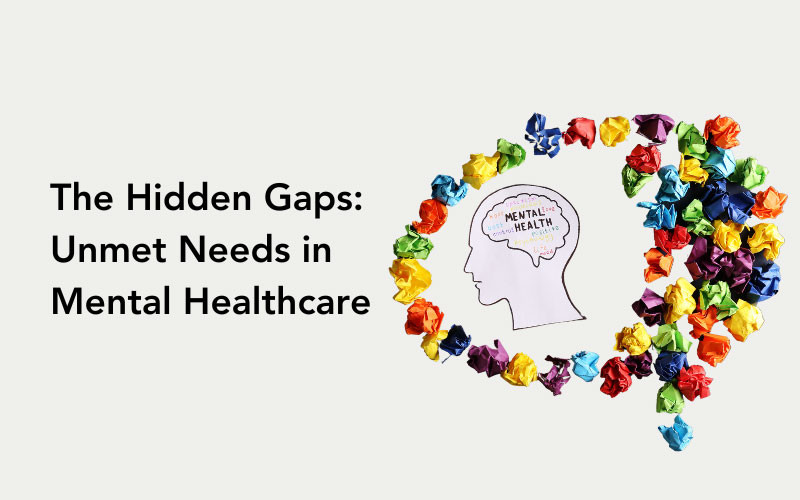The Hidden Gaps: Unmet Needs in Mental Healthcare

In healthcare, mental wellbeing poses persistent challenges that require immediate attention. This blog aims to delve into the unmet needs in mental healthcare, focusing on the intricate struggles of individuals dealing with generalised anxiety disorder (GAD), post-traumatic stress disorder (PTSD), depression, and anorexia nervosa.
Unmet Needs in Mental Healthcare
The unmet needs in mental healthcare are starkly apparent when examining the challenges faced by individuals living with specific conditions. GAD introduces a nuanced set of needs where conventional treatments like cognitive-behavioural therapy and medications might not provide sustained relief. Research shows 3.1% of the U.S. population are affected by GAD, yet only 43.2% are receiving treatment. This highlights the need for Individuals with GAD requiring more targeted interventions that address the underlying causes of their persistent worry, such as personalised coping mechanisms or stress management strategies tailored to their unique circumstances.
PTSD, arising from traumatic experiences, exemplifies unmet needs in the context of trauma-informed care. Study indicates, 6% of the US population will have PTSD at some point in their lives. While exposure therapy and medications are common approaches, they may not fully capture the intricacies of trauma's lasting impact. Tailored interventions, such as trauma-focused cognitive-behavioural therapy or eye movement desensitisation and reprocessing (EMDR), are crucial to addressing the specific needs of individuals with PTSD, allowing for a more comprehensive healing process.
Approximately 280 million people in the world have depression worldwide. The unmet needs become apparent when traditional treatments, including antidepressants and talk therapy, fall short, particularly for treatment-resistant depression. More personalised treatment plans considering individual neurobiological factors, such as genetic markers or biomarkers, can offer insights into alternative interventions, like ketamine infusion therapy or transcranial magnetic stimulation (TMS), providing a lifeline for those resistant to standard approaches.
Anorexia nervosa, an eating disorder affecting approximately 0.5% to 3.7% of women at some point in their lifetime, is intertwined with psychological and physiological intricacies, underscoring the gaps in mental healthcare. Traditional approaches such as psychotherapy and nutritional counselling may fall short in fully addressing the underlying issues. Tailored interventions that integrate psychological support, nutritional guidance, and medical monitoring become imperative. As psychiatrist Stephen Touyz, who has treated anorexia patients for 30 years, pointed out, available treatments often prove insufficient, leaving professionals with little more than the same unsuccessful approaches. "We have nothing else to give but the same treatment that's failed. That's unacceptable to me," Touyz emphasised. For instance, dialectical behaviour therapy (DBT) may offer an effective avenue for addressing the emotional dysregulation often associated with anorexia, presenting a more nuanced approach to care.
These examples shed light on the specific unmet needs within mental healthcare, urging a shift towards more personalised and comprehensive interventions tailored to the unique complexities of each condition.
Why Current Treatments are Sub-Optimal:
In mental healthcare, the effectiveness of current treatments faces significant challenges, impeding comprehensive relief for individuals dealing with conditions such as generalised GAD, PTSD, depression, and anorexia.
1. Heterogeneity Hurdle:
The heterogeneous nature of mental health conditions poses a significant challenge, where what works for one may fall short for another. Consider depression, where the use of selective serotonin reuptake inhibitors (SSRIs) may bring relief to some yet prove ineffective for others. This emphasises the necessity for personalised treatment plans that cater to individual nuances. In a case study, a patient grappling with depression found little solace in traditional talk therapy. However, a tailored approach integrating mindfulness and expressive arts therapy yielded substantial relief, showing the critical importance of interventions tailored to the unique needs of each individual. Notably, with approximately 30% of patients experiencing treatment-resistant depression, the call for diverse and individualised therapeutic strategies becomes even more pronounced.
2. Neurobiological Enigma:
Mental health is a complex and intricate field that requires a deep understanding of neurobiology to develop precise treatments. However, despite our limited knowledge, there is hope for personalised therapeutic approaches that can be effective in treating conditions like GAD. A recent study demonstrated this by utilising advanced neuroimaging studies to uncover unique neurobiological markers for a patient with GAD who was resistant to standard interventions. This ground-breaking discovery led to a tailored strategy incorporating exposure therapy and neurofeedback, highlighting the potential for a more constructive approach to mental health interventions. In light of the fact that 50% of patients with GAD do not respond to first-line treatments, these innovative, individualised approaches become even more crucial in addressing the diverse needs of individuals with mental health conditions.
Burden on Patients and the Economy:
The impact of unmet needs in mental healthcare reaches far beyond individual distress, imposing a substantial economic burden. Recent studies show the staggering scale of this issue; untreated mental health conditions contribute to an estimated annual loss of approximately 200 million workdays in the United States alone. This significant productivity drain demonstrates the profound economic consequences of neglecting mental health.
This economic toll extends to heightened healthcare costs. Individuals with untreated mental health conditions are statistically two to three times more likely to resort to emergency services, compounding the financial strain on healthcare systems. These escalating costs create a ripple effect, affecting the individuals and the broader societal framework.
Societal repercussions further magnify this burden, as untreated mental health conditions correlate with increased rates of substance abuse and involvement in the criminal justice system. Alarming statistics indicate that individuals with untreated mental health disorders face a higher likelihood of arrest and incarceration. For instance, the story of untreated anxiety, straining relationships and workplace dynamics is emblematic of a pervasive trend affecting communities.
Addressing these gaps in mental healthcare exceeds moral obligation; it is an economic imperative. Investing in mental health support has the potential to save billions. Research highlights that for every dollar spent on mental health treatment, there is a return of up to $4 in improved productivity and overall health. Recognising and rectifying these issues alleviates individual distress and fosters a healthier, more economically resilient society.
Stigma Faced by Patients:
The existing negative attitude towards mental health discourages individuals from seeking assistance, which can lead to the worsening of their conditions. For instance, someone who is struggling with anxiety or depression may feel ashamed or embarrassed to seek help due to the stigma attached to mental health. This can cause the person's condition to worsen over time, leading to further emotional distress.
We must promote understanding, compassion, and open communication to overcome this obstacle. We can start by educating people about mental health and seeking help when needed. We can also create safe and supportive spaces where individuals can openly discuss their mental health concerns without fear of judgment or discrimination. Mental health is a crucial aspect of wellbeing that deserves respect and acceptance. By acknowledging the importance of mental health and treating it with the same level of care and attention as physical health, we can create a more inclusive and supportive society.
The Promise of Psychedelics:
The potential therapeutic benefits of psychedelics have been a topic of growing interest in recent years. Preliminary research suggests that specific substances, such as psilocybin derived from certain mushrooms, hold promise for breakthroughs in treating various mental health conditions.
A recent case study from the Johns Hopkins Centre for Psychedelic and Consciousness Research explored the potential of psilocybin in treating depression. In this study, 24 participants diagnosed with treatment-resistant depression were administered two doses of psilocybin with a one-week interval. Notably, at Week 1, 71% of participants experienced a significant reduction in depressive symptoms. This positive response endured, with the same percentage (71%) maintaining clinical significance at Week 4. The study highlights the potential of psychedelics in treating resistant cases.
It's important to note that while ketamine has been approved in the USA for certain cases, accessibility remains a significant concern as most individuals cannot afford therapy, which costs between $400-600 per infusion. Moreover, in Australia, psilocybin and MDMA have been approved for prescription in treating PTSD and TRD, showcasing a progressive approach to psychedelic-assisted therapy.
In psychedelic research, there have been or are 227 clinical trials investigating the efficacy of psychedelics for various mental illnesses. These trials signify a growing recognition of the potential benefits of these substances, emphasising the need for collaboration among professionals, policymakers, researchers, and society to address gaps in mental health treatment and foster innovation in therapeutic avenues.
In conclusion, the recognition of mental healthcare's significance, coupled with a strategic approach to the unique challenges posed by mental health conditions, offers a pathway towards the development of more effective, personalised, and inclusive mental health interventions. This collective effort strives to ensure mental healthcare meets the diverse needs of every individual, ultimately contributing to the holistic well-being of society.
References
1. Investing in treatment for depression and anxiety leads to fourfold return. World Health Organization. Accessed November 15, 2023. https://www.afro.who.int/news/investing-treatment-depression-and-anxiety-leads-fourfold-return.
2. Ahad AA, Sanchez-Gonzalez M, Junquera P. Understanding and addressing mental health stigma across cultures for improving psychiatric care: A narrative review. Cureus. Published online 2023.
3. Al-Harbi KS. Treatment-resistant depression: therapeutic trends, challenges, and future directions. Patient Prefer Adherence. 2012;6:369-388.
4. Ansara ED. Management of treatment-resistant generalized anxiety disorder. Ment Health Clin. 2020;10(6):326-334. Published 2020 Nov 5.
5. Australian psychiatrists can now prescribe MDMA and psilocybin: Who can access them and how do they work? (2023) The Guardian. Available at: https://www.theguardian.com/australia-news/2023/jul/01/australian-psychiatrists-can-now-prescribe-mdma-and-psilocybin-who-can-access-them-and-how-do-they-work (Accessed: 23 November 2023).
6. Busch FN, Milrod BL, Chen CK, Singer MB. Some techniques of psychodynamic psychotherapy as they apply to treatment of post-traumatic stress disorder. Trauma Focused Psychodynamic Psychotherapy. Published online 2021:37-50.
7. CTG Labs - NCBI. Available at: https://clinicaltrials.gov/search?cond=Mental+Illness&intr=Psychedelics (Accessed: 23 November 2023).
8. Cuijpers P, Stringaris A, Wolpert M. Treatment outcomes for depression: Challenges and opportunities. The Lancet Psychiatry. 2020;7(11):925-927.
9. Davis AK, Barrett FS, May DG, et al. Effects of psilocybin-assisted therapy on major depressive disorder. JAMA Psychiatry. 2021;78(5):481.
10. Ketamine clinics have emerged across the US. theyre already going bust (2023) The Guardian. Available at: https://www.theguardian.com/society/2023/apr/11/ketamine-clinics-us-business-safety-mental-health (Accessed: 23 November 2023).
11. Kessler RC, Heeringa S, Lakoma MD, et al. Individual and societal effects of mental disorders on earnings in the United States: Results from the National Comorbidity Survey Replication. American Journal of Psychiatry. 2008;165(6):703-711.
12. Lowe H, Toyang N, Steele B, et al. The Therapeutic Potential of Psilocybin. Molecules. 2021;26(10):2948.
13. Saha K, Torous J, Kiciman E, De Choudhury M. Understanding side effects of antidepressants: Large-scale longitudinal study on social media data. JMIR Mental Health. 2021;8(3).
14. Some anorexia patients want the right to die. A few doctors are willing to listen (2023) The Guardian. Available at: https://www.theguardian.com/society/2023/jul/13/anorexia-right-to-die-terminal-mental-health (Accessed: 23 November 2023).
15. Stein DJ, Shoptaw SJ, Vigo DV, et al. Psychiatric diagnosis and treatment in the 21st century: Paradigm shifts versus incremental integration. World Psychiatry. 2022;21(3):393-414.
16. Timulak L. A comparison of emotion-focused therapy and cognitive-behavioural therapy in the treatment of generalised anxiety disorder. http://isrctn.com/. Published online 2017.
17. Wade G. Psychedelic drug psilocybin shows promise treating anorexia in early trials. New Scientist. 2023;259(3449):7.

Author
Alice Hamilton
Project Manager and Medical Writer

